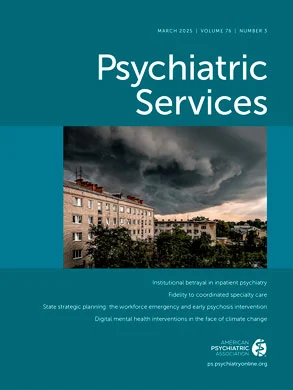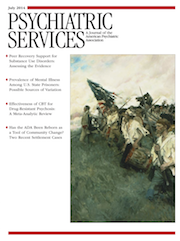Prevalence of somatic conditions, particularly cardiovascular disease, is heightened among persons with mental illness (
1). Conditions like diabetes are often poorly controlled in this population (
2), and some studies suggest that one important reason is poor access to and quality of somatic health care (
2,
3).
Ambulatory care–sensitive (ACS) hospitalizations are commonly used indicators of poor access to or poor quality of primary health care systems (
4,
5). The Agency for Healthcare Research and Quality (AHRQ) defines hospitalizations for 14 conditions among adults and five conditions among children as ACS hospitalizations (
4). Hospitalizations that may be prevented by timely access to effective outpatient care—for example, hospitalizations for diabetes—are considered ACS hospitalizations (
4).
High prevalence and poor control of somatic conditions may place persons with mental illness at increased odds of ACS hospitalization. Two prior studies found that mental illness was associated with increased likelihood of ACS hospitalizations among U.S. adults (
6,
7). One study of older adults showed similar results but was limited to Medicare beneficiaries with comorbid depression and chronic medical illness (
8). To our knowledge, no U.S. study has examined the association between mental illness and ACS hospitalizations among children or older adults with diagnoses other than depression.
To address this gap in the literature, we conducted a study assessing the relationship between mental illness and ACS hospitalizations among Maryland children, adults, and older adults. Using hospital discharge data, we assessed the association between secondary discharge diagnoses of mental illness and primary discharge diagnoses indicating ACS or non-ACS (or “marker”) hospitalizations. Because of differences in burden of somatic conditions and variation in type, severity, and duration of mental illnesses across the life span, the relationship between mental illness and ACS hospitalizations could differ by age. Given efforts to integrate delivery of somatic and behavioral health care to address the high burden of somatic conditions and prevent costly hospitalizations in this population (
9), it is important to understand the relationship between mental illness and ACS hospitalizations across the life span.
Methods
We conducted a retrospective, cross-sectional study using 2005–2010 Maryland hospital discharge data. Because ACS hospitalizations are relatively rare among children, six years of data were used to ensure sufficient sample size and assess associations between mental illness and ACS hospitalizations in this age group. The data set included all discharges from acute care hospitals in Maryland. In accordance with Li and colleagues (
6) and Cahoon and colleagues (
7), the independent variable was secondary diagnosis of mental illness, defined as diagnoses with
ICD-9-CM codes 295–302, 306–309, and 311–314. The dependent variable was a dichotomous indicator of any ACS hospitalization, defined per the AHRQ algorithm and calculated with the primary discharge diagnosis (
4). The
ICD-9-CM codes used to identify these diagnoses are available from AHRQ (
4).
Following Billings and colleagues (
10) and Li and colleagues (
6), we compared ACS hospitalizations with “marker” hospitalizations. In direct contrast to ACS hospitalizations, marker hospitalizations were defined as hospitalizations for acute conditions unlikely to be prevented by outpatient care. For adults, marker hospitalizations included hospitalizations with primary discharge diagnoses of appendicitis with appendectomy (
ICD-9-CM codes 540–542, with Current Procedural Terminology code 44950, 44955, or 44960), acute myocardial infarction (
ICD-9-CM code 410), gastrointestinal obstruction (
ICD-9-CM code 560), and fracture of the hip or femur (
ICD-9-CM code 820). Because acute myocardial infarction and hip fractures are rare among children, we defined marker hospitalizations for children as hospitalizations with a primary discharge diagnosis of appendicitis with appendectomy, as well as gastrointestinal obstruction and any acute fracture (
ICD-9-CM codes 800–829).
Logistic regression with hospital-specific fixed effects and robust variance estimation was used to evaluate the associations between mental illness and ACS hospitalizations. Hospitalization was the unit of analysis. Standard errors were clustered by hospital. Models assessed whether any mental illness, schizophrenia, bipolar disorder, depression, and anxiety were associated with ACS hospitalizations. Model covariates included age, sex, race, marital status (adults only), primary payer (Medicaid, Medicare, private insurance, other, and uninsured), length of hospital stay, and 16 medical comorbidities, defined with the Clinical Classifications Software. This study was deemed exempt from review by the institutional review board at the Johns Hopkins Bloomberg School of Public Health.
Results
Our analysis included 11,009 hospitalizations (6,314 ACS, 4,695 marker) of children ages ten to 17, 226,044 hospitalizations (189,242 ACS, 36,802 marker) of adults aged 18–64, and 271,089 hospitalizations (210,924 ACS, 60,165 marker) of older adults aged ≥65. Twelve percent of hospitalizations of children involved a secondary diagnosis of any mental illness (<1% schizophrenia, 1.3% bipolar disorder, 2.7% depression, and 2.0% anxiety). Twenty-two percent of hospitalizations of adults aged 18–64 involved a secondary diagnosis of any mental illness (1.7% schizophrenia, 3.7% bipolar disorder, 12.7% depression, and 8.9% anxiety). Nineteen percent of hospitalizations of older adults involved a secondary diagnosis of mental illness (<1% schizophrenia, 1.0% bipolar disorder, 12.2% depression, and 8.4% anxiety).
Regression results are presented in
Table 1. In all three age groups, mental illness was associated with increased odds of ACS hospitalization. Among children, any mental illness (odds ratio [OR]=1.84), depression (OR=2.84), and anxiety (OR=2.17) were associated with higher odds of ACS hospitalization. Among adults and older adults, all mental illness diagnoses studied were associated with heightened odds of ACS hospitalization. Overall, mental illness was associated with 32% higher odds of ACS hospitalization among adults aged 18–64 and 30% higher odds of ACS hospitalization among older adults aged ≥65.
Discussion
Consistent with prior studies among adults (
6,
7), we found that mental illness was associated with increased odds of ACS hospitalization across the life span. Although our descriptive study cannot determine the causes of this relationship, prior research suggests that patient, physician, social, and health system factors contribute to ACS hospitalizations (
11). Among people with mental illness, the high prevalence of somatic conditions (
1), cognitive impairment (
12), communication difficulties (
12), poor social support (
12), and physician misperceptions of physical complaints as psychosomatic (
13) may lead to ACS hospitalizations. In addition, health system factors may make it difficult to manage the somatic conditions that, when poorly controlled, lead to ACS hospitalizations. Low primary care physician supply has been associated with increased rates of ACS hospitalizations in urban areas (
5), and fragmented delivery of somatic and behavioral health care may result in poor access, quality, or continuity of somatic medical care in the population with mental illness (
9).
The Affordable Care Act (ACA) includes several initiatives that may help to address these health system barriers by integrating financing and delivery of somatic and behavioral health care. ACA initiatives that could help improve control of somatic conditions among persons with mental illness include Medicaid health homes (
9), integrated care demonstration projects for persons dually eligible for Medicare and Medicaid (
9), and accountable care organizations (
14). In addition, the Substance Abuse and Mental Health Services Administration is funding integrated delivery of primary and behavioral health care at multiple sites (
9). It is important to include ACS hospitalizations in the performance metrics used to evaluate many of these initiatives (
15). Our study findings suggest that preventing ACS hospitalizations is an important goal for all age groups with mental illness.
Our study had several important limitations. A primary limitation is that our analysis did not identify the causes underlying the relationship between mental illness and ACS hospitalizations. Because the hospital discharge data lacked person-level identifiers, we were unable to account for clustering of hospitalizations per individual. Marker conditions have not been validated for children. Measures of severity and health behaviors were not available in hospital discharge data, and measurement error resulting from unreported diagnoses of mental illness or ACS indicators may bias results. To our knowledge, this is the first study to show an association between mental illness and increased odds of ACS hospitalizations among children as well as adults.
Conclusions
Mental illness was associated in this study with increased odds of ACS hospitalizations across the life span. Future research should examine the potential for integrated general medical and behavioral health care models to address the poorly controlled somatic medical conditions that lead to ACS hospitalizations among persons with mental illness.
Acknowledgments and disclosures
Dr. McGinty gratefully acknowledges the Maryland Health Care Commission Health Disparities Research Fellowship, which funded this work. The authors acknowledge the contributions of Bruce Kozlowski, B.S., S.E.F.
The authors report no competing interests.

